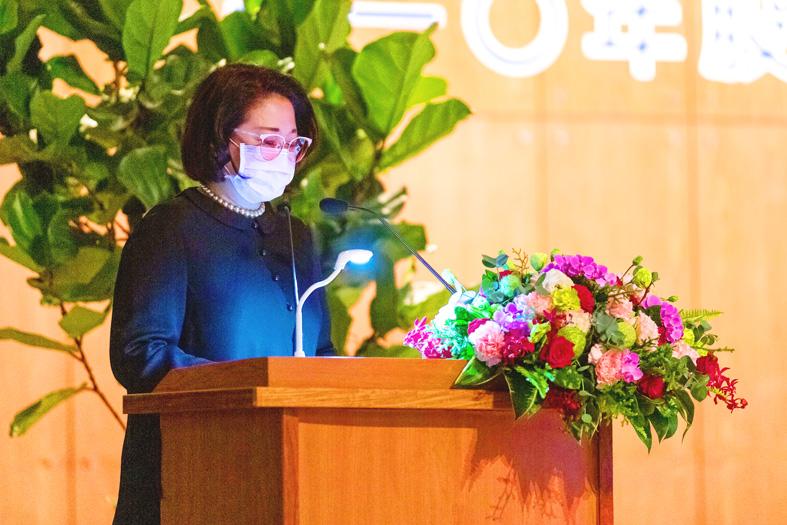Yulon Nissan Motor Co (裕隆日產), which distributes Nissan and Infiniti vehicles in Taiwan, yesterday said it plans to introduce more new models, including of its Leaf electric car, later this year to boost sales.
Yulon Nissan and its local peers are grappling with an unfavorable environment as COVID-19 restrictions and an ongoing chip shortage dampened the nation’s auto sales in the first half of this year, Yulon Nissan chairperson Lilian Chen (嚴陳莉蓮) said in the company’s annual general meeting in New Taipei City’s Sindian District (新店).
The company plans to launch a second-generation Nissan Leaf, which would have 50 percent more battery power than the first one, in the fourth quarter, Chen said.

Photo courtesy of Yulon Nissan Motor Co
A new luxury sports utility vehicle model — the Infiniti QX55 SUV Coupe — is also expected to hit the local market in the fourth quarter, she said.
That would be the second new model under the Infinity series that Yulon Nissan introduces to Taiwan this year, following the launch of the Q50 300GT sedan in the first quarter.
The company expects vehicle sales in China via Dongfeng Nissan Ltd (東風日產), its joint venture with China’s Dongfeng Automobile Co (東風汽車), to drive growth this year, it said in an annual report.
Dongfeng Nissan has set a goal to sell 1.28 million vehicles this year, up 5.79 percent annually, riding on the stabilizing COVID-19 situation in China and a recovering economy.
Yulon Nissan also aims to expand its overseas auto component markets, which currently include Singapore, Egypt, Japan, Thailand, India, South Korea and Middle Eastern countries. Its auto component exports more than halved to NT$70 million last year from NT$150 million in 2019 as demand shrank amid COVID-19 restrictions.
Shareholders yesterday approved a proposal to distribute a cash dividend of NT$18.53 per share, representing a payout ratio of 85 percent based on the company’s earnings of NT$21.8 per share last year.
Chen was re-elected as the company’s chairperson and 10 others were elected as board directors.
The company’s net profit fell about 11 percent to NT$6.54 billion (US$233.07 million) last year from NT$7.28 billion in 2019.
Its auto sales dropped 4.3 percent to 36,200 units last year from 37,821 units.

SEEKING CLARITY: Washington should not adopt measures that create uncertainties for ‘existing semiconductor investments,’ TSMC said referring to its US$165 billion in the US Taiwan Semiconductor Manufacturing Co (TSMC, 台積電) told the US that any future tariffs on Taiwanese semiconductors could reduce demand for chips and derail its pledge to increase its investment in Arizona. “New import restrictions could jeopardize current US leadership in the competitive technology industry and create uncertainties for many committed semiconductor capital projects in the US, including TSMC Arizona’s significant investment plan in Phoenix,” the chipmaker wrote in a letter to the US Department of Commerce. TSMC issued the warning in response to a solicitation for comments by the department on a possible tariff on semiconductor imports by US President Donald Trump’s

‘FAILED EXPORT CONTROLS’: Jensen Huang said that Washington should maximize the speed of AI diffusion, because not doing so would give competitors an advantage Nvidia Corp cofounder and chief executive officer Jensen Huang (黃仁勳) yesterday criticized the US government’s restrictions on exports of artificial intelligence (AI) chips to China, saying that the policy was a failure and would only spur China to accelerate AI development. The export controls gave China the spirit, motivation and government support to accelerate AI development, Huang told reporters at the Computex trade show in Taipei. The competition in China is already intense, given its strong software capabilities, extensive technology ecosystems and work efficiency, he said. “All in all, the export controls were a failure. The facts would suggest it,” he said. “The US

The government has launched a three-pronged strategy to attract local and international talent, aiming to position Taiwan as a new global hub following Nvidia Corp’s announcement that it has chosen Taipei as the site of its Taiwan headquarters. Nvidia cofounder and CEO Jensen Huang (黃仁勳) on Monday last week announced during his keynote speech at the Computex trade show in Taipei that the Nvidia Constellation, the company’s planned Taiwan headquarters, would be located in the Beitou-Shilin Technology Park (北投士林科技園區) in Taipei. Huang’s decision to establish a base in Taiwan is “primarily due to Taiwan’s talent pool and its strength in the semiconductor

French President Emmanuel Macron has expressed gratitude to Hon Hai Precision Industry Co (鴻海精密) for its plan to invest approximately 250 million euros (US$278 million) in a joint venture in France focused on the semiconductor and space industries. On his official X account on Tuesday, Macron thanked Hon Hai, also known globally as Foxconn Technology Group (富士康科技集團), for its investment projects announced at Choose France, a flagship economic summit held on Monday to attract foreign investment. In the post, Macron included a GIF displaying the national flag of the Republic of China (Taiwan), as he did for other foreign investors, including China-based